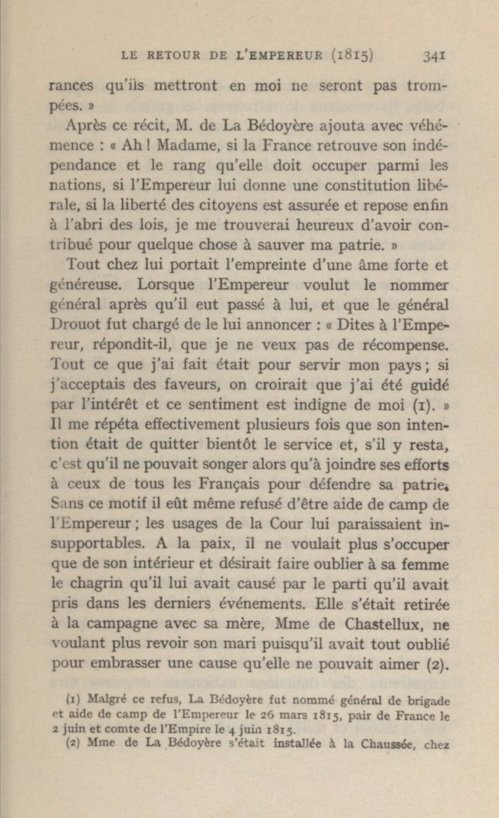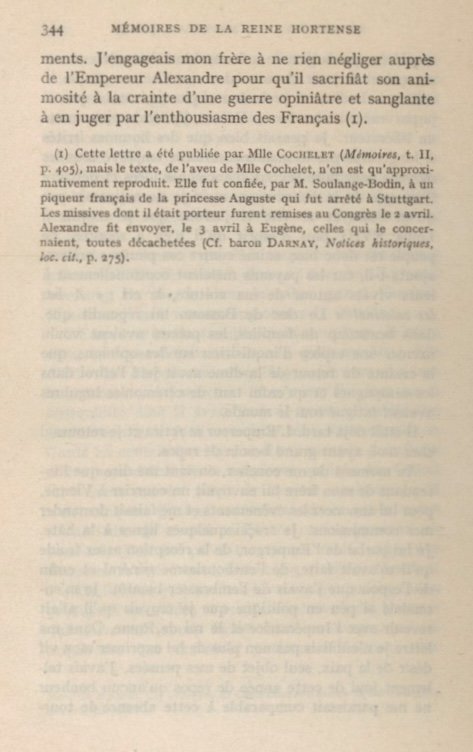Let’s have another look at Hortense’s Memoirs. If you want to read the book it is available for free at the side bar in English and French. Use the widget on the sidebar to translate the text below into pretty much any language.
Hortense also describes the genuine heroism of Monsieur de la Bedoyère who later fell prey to royalist terrorism.
Hortense’s memoirs continues:
Having said this, Monsieur de La Bedoyère added emphatically : "Ah, madame, if France is to regain her independence, if the Emperor will provide her with a liberal constitution, if personal liberty is assured and the national laws are properly enforced, I shall be satisfied, because I shall feel that I have contributed something to my country's salvation."
Everything about him indicated a strong and loyal character. When the Emperor wished to make him general after he had rallied to the imperial cause, and when General Drouot was sent to announce this appointment to him he replied "Tell the Emperor that I am not seeking any reward. If I accept anything people will say I have been acting from motives of personal ambition. Such a sentiment is beneath me."
In fact, he told me several times that he intended to resign from the army and that if he remained in active service it was simply because he was anxious to do his share in defending his country, along with all other Frenchmen. If it had not been for this, he would even have refused to be the Emperor's aide-de-camp, for he detested the etiquette of the court.
During peace-times the only thing he was interested in was his home-life and he tried to make his wife forgive him for the part he had played in the recent events.
She had withdrawn to the country with her mother, Madame de Chastellux, and refused to see her husband again, because he had forsaken everything for a cause which she refused to accept.
As a matter of fact, both their families were devoted to the Bourbons. Madame de La Bedoyère had just recovered the large estates which had previously belonged to them.
Consequently no one lost more than her husband by the Emperor's return, but the more completely he had overlooked this the prouder he was to have done so. Who could help admiring such a character?
After dinner I returned to the Tuileries. The Duc de Vicence had accepted the post of Minister of Foreign Affairs. The Duc d'Otrante had been made chief of police.
The Duc de Bassano was still particularly popular with the Emperor, who had dined alone with him. There were a number of people in the drawing-room when I entered. Several ladies arrived later.
The Emperor chatted informally with everyone. He gave some details in regard to his life on Elba. He mentioned what a consolation it had been for him to have his mother and his sister Pauline there and how much he had enjoyed the quietness of the island.
He conducted his household economically, but it cost him a good deal to keep up his guard, and he had begun to fear that he would have to dismiss it, although several Genoese had often offered to loan him money, fearing he might need some. Someone asked what had given him the idea of returning to France. He replied: "It was the newspapers. For a long time, I did not receive any, and then twenty or more came all at once. I saw that attempts were being made to slander the army and to speak contemptuously of its former successes, while promotions and honors were being handed out to men who had never been under fire. Then too the purchasers of public property were being annoyed, and the important influence the priests were exercising must have made people fear the return of the tithing system. I was sure that if I managed to land in France I should be hailed as a liberator. I was convinced that those who had so long been obliged to undergo hard-ships would employ all possible means to revive former customs and to undo the work the Revolution had accomplished, but I admit I did not think they would set to work so quickly. I thought Louis XVIII cleverer than he turned out to be. The masses seem very incensed against the poor priests," he added, "for everywhere the peasants, when they come to cheer my carriage, cry also ‘A bas les calotins!' ['Down with the church party.']"
The Duc de Bassano replied that in many districts and families the priests had sought to establish a kind of inquisition in regard to personal opinions, the country folk had been alarmed at the return of the tithing system and, moreover, so many gloomy ceremonies had depressed everyone. It was already late.
The Emperor retired, and I too went home in great need of some rest. Just as I was going to bed word came that my brother's steward was sending him a special messenger to Vienna to inform him of the events that had taken place and I was asked if I had any special messages for him.
I hastily scribbled a few lines. I mentioned the Emperor's rather cold reception of me, the general enthusiasm, and expressed the hope of seeing my brother again shortly. I had very little to say about political matters as I believed he would come back with the Empress and the King of Rome. In my letter I did not forget to refer to my earnest hope for peace, which formed the most important object of my thoughts.
I had so much enjoyed this year of mental repose that no other form of happiness seemed to me comparable with that freedom from all anxieties. I urged my brother not to neglect any means of persuading the Emperor Alexander to sacrifice his personal animosity for fear of causing a war which to judge by the enthusiasm of the French nation would be sanguinary and long drawn out.
The original French is available below:






